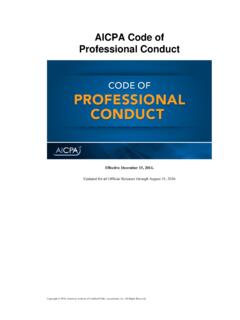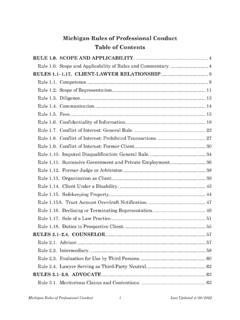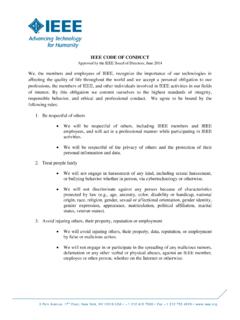Transcription of Code of Conduct for responsible Research - WHO
1 Code of Conduct for responsible Research November 2017 Code of Conduct for responsible Research 2 Acknowledgements This document was prepared by the Office of Compliance, Risk Management and Ethics (CRE) of WHO. CRE s objective is to pursue excellence at all levels of WHO in an effective, efficient, transparent and accountable way by promoting and upholding the highest organizational standards, ethical principles and Conduct . This Code of Conduct was developed based on the WHO Strategy on Research for Health, which is the product of years of consultations between different WHO departments. Many WHO staff members have contributed to this document, and particular thanks go to the Special Programme for Research and Training in tropical Diseases (TDR), the Research Ethics Review Committee (ERC), the Research , Ethics and Knowledge Uptake unit (IER/REK), and the Office of the Legal Counsel (LEG) for their inputs.
2 The content has been further enriched thanks to contributions and comments from across WHO collected through the all staff consultation process undertaken by CRE between December 2016 and February 2017. Disclaimer This document is provided for information only, for the purpose of transparency, and includes references to other internal WHO documents, which may not be accessible. It should not be reproduced. Code of Conduct for responsible Research 3 Table of contents Contents 1. Glossary and links .. 4 2. Introduction: fostering responsible Research .. 7 Objectives .. 7 Scope: defining Research .. 7 Coverage.
3 10 3. Guiding ethical principles for responsible Research .. 10 4. Wrongdoing in Research and questionable or poor practice .. 12 5. Applying standards of good practice in the Conduct of Research .. 13 Adherence to Research standards .. 13 Research training and supervision .. 14 Conflict of interest and 15 Managing collaboration in Research .. 17 The financial management of Research .. 17 Quality management in Research .. 18 Managing and monitoring Research data .. 20 Peer review .. 21 Intellectual property and authorship .. 21 Publication and dissemination of Research findings .. 23 6. Final note.
4 25 7. Selected resources .. 25 Code of Conduct for responsible Research 4 1. Glossary and links Clearance procedures for publications lays out the procedures for all proposals for publications to be issued by WHO to be cleared before development begins. Code of Ethics and Professional Conduct - provides a standard to assist staff members and collaborators in carrying out WHO s mission while respecting WHO s basic principles of ethical behaviour. It provides guidance to ensure that the principles of integrity, accountability, independence/impartiality, respect and professional commitment are followed at all levels of the Organization.
5 Collaborators - individuals who work for WHO as non-staff members, including consultants, holders of Agreements for Performance of Work (APW), Technical Services Agreement (TSA) holders, Special Service Agreements (SSA) or letters of agreement, Temporary Advisers, Interns, and Volunteers, as well as third party entities such as vendors, contractors or technical partners who have a contractual relationship with WHO. Declaration of interest for staff members form that WHO staff members in designated functions are requested to complete annually to declare any interest that may conflict with their work at WHO.
6 Declaration of interest for experts form that external experts are requested to complete before they can initiate their collaboration with WHO. External experts are asked to declare any circumstance that could represent a conflict of interest related to their expertise. Fabrication of data - deliberate creation, recording and reporting of nonexistent results Falsification - deliberate manipulation of data to change, or omit data, including the deceptive manipulation of images Financial regulations and financial rules - The Financial Regulations govern the financial administration of the Organization. The Financial Rules are established by the Director-General, including relevant guidelines and limits for the implementation of the Financial Regulations, in order to ensure effective financial administration, the exercise of economy, and safeguard of the assets of the Organization.
7 Framework of Engagement with Non State Actors - is a process and instrument to identify the risks, balancing them against the expected benefits, while protecting and preserving WHO s integrity, reputation and public health mandate and thereby enables WHO s engagement with non state actors (nongovernmental organizations, private sector entities, philanthropic foundations, and academic institutions) Fraud Prevention Policy and Fraud Awareness Guidelines defines fraud as "misappropriation, irregularities and illegal acts characterized by deceit, concealment or violation of trust", and establishes an investigation process.
8 Guidelines for Declaration of Interests - explain the meaning of a "conflict of interest"; identify when an external expert must complete a declaration of interests form ("DOI Form"); explain how the WHO Secretariat through the relevant technical unit (the Secretariat ), should assess the information disclosed; and describe what actions should be taken when a potential conflict appears to exist. The Guidelines also describe the Public Notice and Comment procedure and provide a listing of practical considerations relating to the selection of experts and the management of conflicts of interest Integrity Hotline - a telephone number, email, or web tool providing a safe and independent mechanism to report any concerns about issues involving WHO or other partners (See below).
9 Information about, and access to, the Hotline is available here: #integrity Code of Conduct for responsible Research 5 Misconduct - any improper action by a staff member in his official capacity; any Conduct by a staff member, unconnected with his official duties, tending to bring the Organization into public discredit; any improper use or attempt to make use of his position as an official for his personal advantage; any Conduct contrary to the terms of his oath or declaration. Wrongdoing in Research - intentional, fraudulent or grossly negligent behaviour such as fabrication, falsification, plagiarism, deliberate misrepresentation or other practices by a staff member or collaborator that seriously deviate from this Code Outside activities - Engagement in outside occupation or employment, paid or unpaid, may interfere with exercise of the staff members WHO functions.
10 Some external activities may be incompatible with the status of World Health Organization employees, or conflict with the best interest of the Organization. Plagiarism - the copying of ideas, data or text (or various combinations of the three) without proper acknowledgement and misappropriation as one s own; Piracy - unauthorized use, reproduction, or sharing of intellectual property; Policy on Misconduct in Research outlines actions to be taken when reports of wrongdoing in Research are brought against individuals working for or collaborating with WHO. Policy on open access - Taking account of WHO s obligations as an intergovernmental organization (IGO) aiming to increase the reach and usage of WHO publications, and to maximizing access to WHO-authored and WHO-funded work published externally, this policy supports open access to the published output of its activities as a fundamental part of its mission and a public benefit to be encouraged wherever possible.















